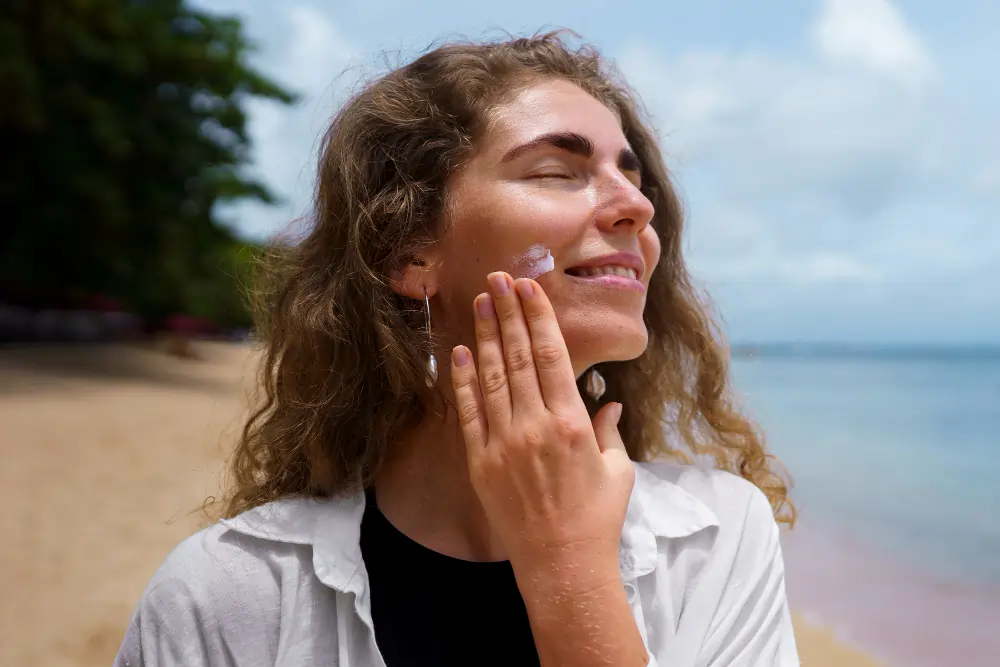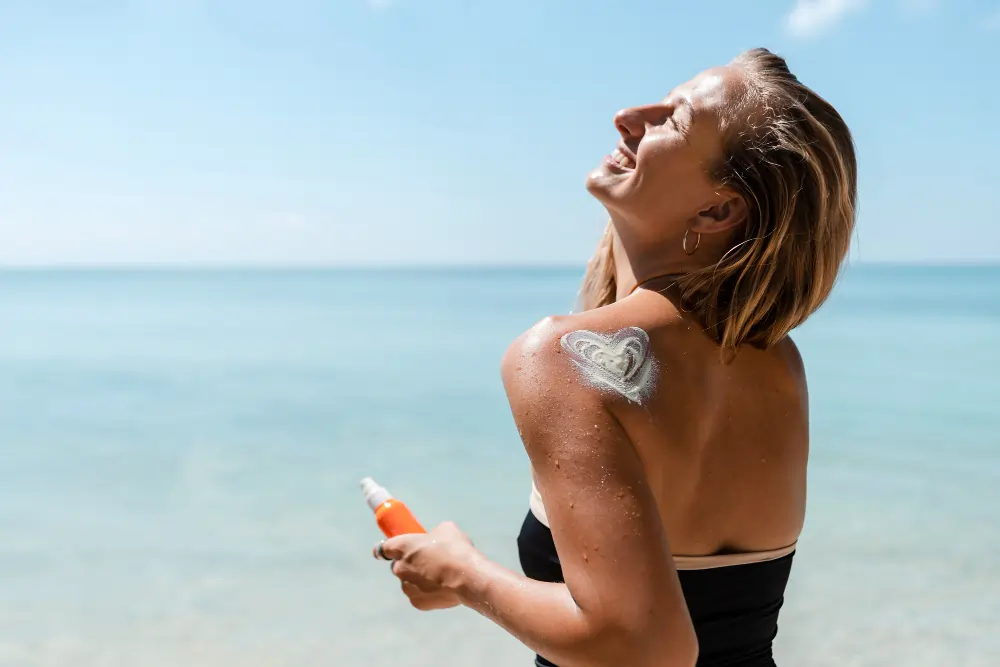Introduction
Sunscreen has long been hailed as a savior against the harmful effects of the sun’s rays. It protects our skin from sunburns, premature aging, and even skin cancer. However, recent research has shed light on the potential dark side of sunscreen, raising concerns about its impact on our health. In this article, we delve into the potential health risks associated with sunscreen and explore alternative ways to protect our skin.
1. Chemical Ingredients
The presence of chemical ingredients in sunscreen has raised concerns regarding their potential impact on our health. While these chemicals, such as oxybenzone and octinoxate, effectively absorb UV radiation, research suggests that they may also have adverse effects.
One significant concern is the potential hormone disruption caused by certain chemical ingredients in sunscreen. Studies have indicated that chemicals like oxybenzone can interfere with hormone function, leading to hormonal imbalances and potential long-term health implications. Additionally, individuals with sensitive skin may experience allergic reactions or skin irritations due to these chemical compounds.
To address these concerns, experts recommend exploring alternative sunscreens with mineral-based ingredients like zinc oxide or titanium dioxide. These ingredients work by physically blocking and reflecting the sun’s rays rather than being absorbed into the skin. Mineral-based sunscreens are generally considered safer options, especially for those with sensitive skin or concerns about chemical exposure.
It is important to note that not all chemical ingredients in sunscreen pose the same level of risk. Ongoing research aims to identify safer and more effective formulations that minimize potential health concerns.
2. Environmental Impact

The environmental impact of sunscreen is a growing concern as studies have shown that certain chemicals found in sunscreen can cause damage to marine ecosystems, particularly coral reefs. When we swim or shower, the sunscreen we apply washes off and enters our water systems, eventually making its way to the ocean.
Chemicals like oxybenzone and octinoxate have been found to harm coral reefs, leading to reef deterioration, bleaching, and even death. These chemicals can also impact other marine life, including fish and sea turtles, by affecting their development and reproductive systems.
To address this concern, some regions have banned or restricted the use of certain sunscreen ingredients, including oxybenzone and octinoxate. While these bans are a step in the right direction, it is important to recognize that other chemicals and pollutants also contribute to environmental damage.
To reduce the environmental impact of sunscreen, experts recommend using mineral-based sunscreens with zinc oxide or titanium dioxide as active ingredients. These ingredients are less likely to harm marine life and are biodegradable.
3. Vitamin D Deficiency
Vitamin D deficiency is a prevalent health concern that can have significant impacts on our overall well-being. This essential nutrient plays a crucial role in maintaining bone health, supporting immune function, and regulating mood.
One of the primary sources of vitamin D is sunlight. When our skin is exposed to sunlight, it triggers a process that converts cholesterol in our skin into vitamin D. However, factors such as limited sunlight exposure, the use of sunscreen, and living in regions with less sunlight can contribute to vitamin D deficiency.
A deficiency in vitamin D can lead to various health issues. In terms of bone health, inadequate vitamin D levels can impair calcium absorption, which may result in weakened bones, increased risk of fractures, and conditions like osteoporosis. Vitamin D also plays a vital role in supporting our immune system, and a deficiency can make us more susceptible to infections and illnesses.
Furthermore, emerging research suggests that vitamin D deficiency may be linked to mood disorders such as depression and Seasonal Affective Disorder (SAD). Sunlight exposure helps regulate serotonin levels in the brain, which affects our mood. Insufficient vitamin D levels may contribute to imbalances in serotonin, potentially impacting our mental well-being.
To address vitamin D deficiency, it is important to ensure adequate sunlight exposure. Spending time outdoors, especially during peak sunlight hours, can help boost vitamin D production in the body. However, it is essential to balance sunlight exposure with the need for sun protection to prevent the harmful effects of UV radiation.
In cases where sunlight exposure is limited or not possible, vitamin D supplements may be recommended. These supplements can help maintain optimal vitamin D levels and support overall health. It is important to consult with a healthcare professional to determine the appropriate dosage and duration for supplementation.
4. Sunscreen Misuse

Proper and effective use of sunscreen is essential for protecting our skin from the harmful effects of the sun’s ultraviolet (UV) rays. However, sunscreen misuse is a common issue that can compromise its effectiveness and potentially lead to negative consequences for our skin health.
One common mistake is not applying sunscreen generously enough. To ensure adequate protection, it is recommended to apply a sufficient amount of sunscreen to cover all exposed areas of the skin. This includes areas often overlooked, such as the ears, back of the neck, and tops of the feet. Insufficient application can leave these areas vulnerable to sunburn and long-term damage caused by UV radiation.
Another aspect of sunscreen misuse is not reapplying it regularly. Sunscreen should be reapplied every two hours, or more frequently if sweating excessively or after swimming. Failure to reapply sunscreen diminishes its effectiveness over time, as it can be rubbed off, washed away, or broken down due to sun exposure. Regular reapplication ensures continuous protection and reduces the risk of sunburn and skin damage.
Additionally, using expired sunscreen or not storing it properly can also contribute to its misuse. Sunscreen has an expiration date, and using it beyond that date can reduce its effectiveness. It is crucial to check the expiration date and replace sunscreen as needed. Proper storage, away from direct sunlight and excessive heat, helps maintain the integrity of the product and ensures its efficacy.
It is important to understand that sunscreen alone is not a foolproof solution for sun protection. It should be used in conjunction with other sun-safe practices, such as seeking shade during peak sun hours, wearing protective clothing, and using hats and sunglasses. These measures complement the use of sunscreen and provide comprehensive protection against harmful UV radiation.
Conclusion
While sunscreen undoubtedly plays a vital role in safeguarding our skin from the sun’s harmful rays, it’s crucial to be aware of the potential health concerns associated with its use. Exploring alternative sun protection methods, such as seeking shade during peak sun hours and wearing protective clothing, can help mitigate some of these concerns. As research continues to unfold, it is essential to stay informed and make informed choices about sun protection that prioritize both our health and the environment.
FAQs
1. Is sunscreen safe to use or does it have potential health risks?
People have concerns about the safety of sunscreen due to the chemicals it contains. While sunscreen is generally considered safe, some studies suggest that certain chemical filters may have potential health risks. It’s important to choose a sunscreen with ingredients that suit your preferences and consult with a healthcare professional if you have specific concerns.
2. Can sunscreen cause hormonal imbalances or disrupt endocrine function?
Some research suggests that certain chemical ingredients commonly found in sunscreens, such as oxybenzone, may have the potential to disrupt hormonal balance or affect endocrine function. However, the extent of this risk and its impact on human health requires further investigation. If you have concerns, consider using mineral-based sunscreens as an alternative.
3. Are there any allergic reactions associated with sunscreen use?
Allergic reactions to sunscreen ingredients can occur, although they are relatively rare. Some people may be sensitive or allergic to certain chemical filters, fragrances, or preservatives found in sunscreen. It is recommended to perform a patch test or consult with a dermatologist if you have a history of allergic reactions to skincare products.
4. Are there any environmental concerns related to sunscreen?
Certain chemical sunscreen ingredients, such as oxybenzone and octinoxate, have raised environmental concerns due to their potential impact on coral reefs and marine ecosystems. To minimize environmental impact, consider using reef-safe or mineral-based sunscreens that do not contain these chemicals.
5. Can sunscreen use contribute to vitamin D deficiency?
Sunscreen, when used correctly, can reduce the production of vitamin D in the skin as it blocks UV radiation. However, it is still important to protect your skin from excessive sun exposure to prevent sunburn and skin damage. To maintain adequate vitamin D levels, consider getting moderate sun exposure during non-peak hours or consult with a healthcare professional about vitamin D supplementation.



